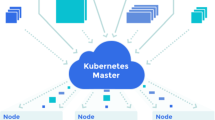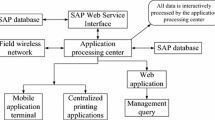Abstract
Container virtualization technology represented by Docker has been widely used in the industry due to its advantages of lightweight, fast deployment, and easy portability. This paper considers the scenarios of AI-based IoT applications based on container technology in a cloud-edge collaborative environment, and proposes a container-based task scheduling algorithm. Using priority-aware greedy strategy, a new scheduling algorithm named PGT has been proposed which adopts the multi-criteria approach Technique for Order Preference by Similarity to Ideal Solution (TOPSIS). The containers in cloud servers and edge servers are managed in a uniform platform, and IoT application services are deployed in containers. The task with smaller deadline constraint is scheduled first due to its higher priority. Then, multiple indicators are considered comprehensively, such as task response time, energy consumption, task execution cost, to find the optimal container to execute task. Through varying the number of edge servers and the number of tasks, the simulation results in a cloud-edge collaborative environment indicate that the proposed scheduling approach outperforms the four baseline algorithms in improving QoS satisfaction rate, energy consumption, penalty cost and total violation time.
















Similar content being viewed by others
Data availability
The datasets generated during the current study are available from the corresponding author on reasonable request.
References
Shi, W., Cao, J., Zhang, Q., Li, Y., Xu, L.: Edge computing: vision and challenges. IEEE Internet Things J. 3(5), 637–646 (2016). https://doi.org/10.1109/JIOT.2016.2579198
Mao, Y., You, C., Zhang, J., Huang, K., Letaief, K.B.: A survey on mobile edge computing: the communication perspective. IEEE Commun. Surv. Tutorials 19(4), 2322–2358 (2017). https://doi.org/10.1109/COMST.2017.2745201
Tang, B., Kang, L.: Eicache: a learning-based intelligent caching strategy in mobile edge computing. Peer-to-Peer Netw. Appl. 15(2), 934–949 (2022). https://doi.org/10.1007/s12083-021-01266-4
Tang, L., Tang, B., Zhang, L., Guo, F., He, H.: Joint optimization of network selection and task offloading for vehicular edge computing. J. Cloud Comput. 10(1), 23 (2021). https://doi.org/10.1186/s13677-021-00240-y
Tang, L., Tang, B., Tang, L., Guo, F., Zhang, J.: Reliable mobile edge service offloading based on P2P distributed networks. Symmetry 12(5), 821 (2020). https://doi.org/10.3390/sym12050821
He, X., Tu, Z., Xu, X., Wang, Z.: Programming framework and infrastructure for self-adaptation and optimized evolution method for microservice systems in cloud-edge environments. Future Gener. Comput. Syst. 118, 263–281 (2021). https://doi.org/10.1016/j.future.2021.01.008
Alam, M., Rufino, J., Ferreira, J., Ahmed, S.H., Shah, N., Chen, Y.: Orchestration of microservices for iot using docker and edge computing. IEEE Commun. Mag. 56(9), 118–123 (2018). https://doi.org/10.1109/MCOM.2018.1701233
Guo, F., Tang, B., Tang, M.: Joint optimization of delay and cost for microservice composition in mobile edge computing. World Wide Web (2022). https://doi.org/10.1007/s11280-022-01017-2
Guo, F., Tang, B., Tang, M., Liang, W.: Deep reinforcement learning-based microservice selection in mobile edge computing. Clust. Comput. (2022). https://doi.org/10.1007/s10586-022-03661-9
Lin, L., Liao, X., Jin, H., Li, P.: Computation offloading toward edge computing. Proc. IEEE 107(8), 1584–1607 (2019). https://doi.org/10.1109/JPROC.2019.2922285
Bozic, J., Tabernik, D., Skocaj, D.: Mixed supervision for surface-defect detection: from weakly to fully supervised learning. Comput. Ind. 129, 103459 (2021). https://doi.org/10.1016/j.compind.2021.103459
Kim, J., Ko, J., Choi, H., Kim, H.: Printed circuit board defect detection using deep learning via A skip-connected convolutional autoencoder. Sensors 21(15), 4968 (2021). https://doi.org/10.3390/s21154968
Li, J., Huang, T., Yang, Y., Xu, Q.: Detection and recognition of characters on the surface of metal workpieces with complex background. In: 2020 IEEE 4th Information Technology, Networking, Electronic and Automation Control Conference (ITNEC), vol. 1, pp. 2236–2240 (2020). https://doi.org/10.1109/ITNEC48623.2020.9085200
Zhang, Y., Tang, B., Luo, J., Zhang, J.: Deadline-aware dynamic task scheduling in edge-cloud collaborative computing. Electronics 11(15), 25 (2022). https://doi.org/10.3390/electronics11152464
You, Q., Tang, B.: Efficient task offloading using particle swarm optimization algorithm in edge computing for industrial internet of things. J. Cloud Comput. 10(1), 41 (2021). https://doi.org/10.1186/s13677-021-00256-4
Mishra, S.K., Sahoo, S., Sahoo, B., Jena, S.K.: Energy-efficient service allocation techniques in cloud: a survey. IETE Tech. Rev. 37(4), 339–352 (2020). https://doi.org/10.1080/02564602.2019.1620648
Behzadian, M., Otaghsara, S.K., Yazdani, M., Ignatius, J.: A state-of the-art survey of TOPSIS applications. Expert Syst. Appl. 39(17), 13051–13069 (2012). https://doi.org/10.1016/j.eswa.2012.05.056
Gai, K., Qin, X., Zhu, L.: An energy-aware high performance task allocation strategy in heterogeneous fog computing environments. IEEE Trans. Comput. 70(4), 626–639 (2021). https://doi.org/10.1109/TC.2020.2993561
Misra, S., Saha, N.: Detour: dynamic task offloading in software-defined fog for iot applications. IEEE J. Sel. Areas Commun. 37(5), 1159–1166 (2019). https://doi.org/10.1109/JSAC.2019.2906793
Mishra, S.K., Puthal, D., Rodrigues, J.J.P.C., Sahoo, B.D., Dutkiewicz, E.: Sustainable service allocation using a metaheuristic technique in a fog server for industrial applications. IEEE Trans. Ind. Inform. 14(10), 4497–4506 (2018). https://doi.org/10.1109/TII.2018.2791619
Ale, L., Zhang, N., Fang, X., Chen, X., Wu, S., Li, L.: Delay-aware and energy-efficient computation offloading in mobile-edge computing using deep reinforcement learning. IEEE Trans. Cogn. Commun. Netw. 7(3), 881–892 (2021). https://doi.org/10.1109/TCCN.2021.3066619
Nguyen, B.M., Binh, B.T.H., Anh, T.T., Son, D.B.: Evolutionary algorithms to optimize task scheduling problem for the iot based bag-of-tasks application in cloud–fog computing environment. Appl. Sci. 9(9), 58 (2019). https://doi.org/10.3390/app9091730
Azizi, S., Shojafar, M., Abawajy, J.H., Buyya, R.: Deadline-aware and energy-efficient iot task scheduling in fog computing systems: a semi-greedy approach. J. Netw. Comput. Appl. 201, 103333 (2022). https://doi.org/10.1016/j.jnca.2022.103333
Karthick, A.V., Ramaraj, E., Subramanian, R.G.: An efficient multi queue job scheduling for cloud computing. In: 2014 World Congress on Computing and Communication Technologies, pp. 164–166 (2014). https://doi.org/10.1109/WCCCT.2014.8
Stankovic, J.A., Spuri, M., Ramamritham, K., Buttazzo, G.C.: Deadline Scheduling for Real-Time Systems: EDF and Related Algorithms. Springer, New York (1998). https://doi.org/10.1007/978-1-4615-5535-3
Ru, J., Keung, J.: An empirical investigation on the simulation of priority and shortest-job-first scheduling for cloud-based software systems. In: 22nd Australian Conference on Software Engineering (ASWEC 2013), 4-7 June 2013, Melbourne, Victoria, Australia, pp. 78–87. IEEE Computer Society (2013). https://doi.org/10.1109/ASWEC.2013.19
Chen, Z., Wei, P., Li, Y.: Combining neural network-based method with heuristic policy for optimal task scheduling in hierarchical edge cloud. Digit. Commun. Netw. (2022). https://doi.org/10.1016/j.dcan.2022.04.023
Hassan, H.O., Azizi, S., Shojafar, M.: Priority, network and energy-aware placement of iot-based application services in fog-cloud environments. IET Commun. 14(13), 2117–2129 (2020). https://doi.org/10.1049/iet-com.2020.0007
Wan, J., Chen, B., Wang, S., Xia, M., Li, D., Liu, C.: Fog computing for energy-aware load balancing and scheduling in smart factory. IEEE Trans. Ind. Inform. 14(10), 4548–4556 (2018). https://doi.org/10.1109/TII.2018.2818932
Yousefpour, A., Patil, A., Ishigaki, G., Kim, I., Wang, X., Cankaya, H.C., Zhang, Q., Xie, W., Jue, J.P.: FOGPLAN: a lightweight qos-aware dynamic fog service provisioning framework. IEEE Internet Things J. 6(3), 5080–5096 (2019). https://doi.org/10.1109/JIOT.2019.2896311
Hoseiny, F., Azizi, S., Shojafar, M., Tafazolli, R.: Joint qos-aware and cost-efficient task scheduling for fog-cloud resources in a volunteer computing system. ACM Trans. Internet Techn. 21(4), 86:1-86:21 (2021). https://doi.org/10.1145/3418501
Panwar, N., Negi, S., Rauthan, M.M.S., Vaisla, K.S.: TOPSIS-PSO inspired non-preemptive tasks scheduling algorithm in cloud environment. Clust. Comput. 22(4), 1379–1396 (2019). https://doi.org/10.1007/s10586-019-02915-3
Tang, B., Fedak, G.: Wukastore: scalable, configurable and reliable data storage on hybrid volunteered cloud and desktop systems. IEEE Trans. Big Data 8(1), 85–98 (2022). https://doi.org/10.1109/TBDATA.2017.2758791
Buyya, R., Murshed, M.M.: Gridsim: a toolkit for the modeling and simulation of distributed resource management and scheduling for grid computing. Concurr. Comput. Pract. Exp. 14(13–15), 1175–1220 (2002). https://doi.org/10.1002/cpe.710
Chen, L., Guo, K., Fan, G., Wang, C., Song, S.: Resource constrained profit optimization method for task scheduling in edge cloud. IEEE Access 8, 118638–118652 (2020). https://doi.org/10.1109/ACCESS.2020.3000985
Xu, J., Hao, Z., Zhang, R., Sun, X.: A method based on the combination of laxity and ant colony system for cloud-fog task scheduling. IEEE Access 7, 116218–116226 (2019). https://doi.org/10.1109/ACCESS.2019.2936116
Xiong, Y., Sun, Y., Xing, L., Huang, Y.: Extend cloud to edge with kubeedge. In: 2018 IEEE/ACM Symposium on Edge Computing, SEC 2018, Seattle, October 25-27, 2018, pp. 373–377. IEEE (2018). https://doi.org/10.1109/SEC.2018.00048
Menouer, T.: KCSS: kubernetes container scheduling strategy. J. Supercomput. 77(5), 4267–4293 (2021). https://doi.org/10.1007/s11227-020-03427-3
Rausch, T., Rashed, A., Dustdar, S.: Optimized container scheduling for data-intensive serverless edge computing. Future Gener. Comput. Syst. 114, 259–271 (2021). https://doi.org/10.1016/j.future.2020.07.017
Hu, Y., de Laat, C.T.A.M., Zhao, Z.: Multi-objective container deployment on heterogeneous clusters. In: 19th IEEE/ACM International Symposium on Cluster, Cloud and Grid Computing, CCGRID 2019, Larnaca, Cyprus, May 14-17, 2019, pp. 592–599. IEEE (2019). https://doi.org/10.1109/CCGRID.2019.00076
Ghanavati, S., Abawajy, J.H., Izadi, D.: An energy aware task scheduling model using ant-mating optimization in fog computing environment. IEEE Trans. Serv. Comput. 1(1), 12 (2020)
Zhang, Q., Liang, H., Xing, Y.: A parallel task scheduling algorithm based on fuzzy clustering in cloud computing environment. Int. J. Mach. Learn. Comput 4(5), 437–444 (2014)
Panwar, N., Negi, S., Rauthan, M.M.S.: Non-live task migration approach for scheduling in cloud based applications. In: International Conference on Next Generation Computing Technologies (NGCT 2017), pp. 124–137. Springer (2017)
Stavrinides, G.L., Karatza, H.D.: An energy-efficient, qos-aware and cost-effective scheduling approach for real-time workflow applications in cloud computing systems utilizing DVFS and approximate computations. Future Gener. Comput. Syst. 96, 216–226 (2019). https://doi.org/10.1016/j.future.2019.02.019
Jayakumar, D.N., Venkatesh, P.: Glowworm swarm optimization algorithm with topsis for solving multiple objective environmental economic dispatch problem. Appl. Soft Comput. 23, 375–386 (2014). https://doi.org/10.1016/j.asoc.2014.06.049
Hashimoto, Y., Aida, K.: Evaluation of performance degradation in HPC applications with VM consolidation. In: Third International Conference on Networking and Computing, ICNC 2012, Okinawa, Japan, December 5-7, 2012, pp. 273–277. IEEE Computer Society (2012). https://doi.org/10.1109/ICNC.2012.50
Acknowledgements
The authors would like to thank all the reviewers for their helpful comments.
Funding
This work is supported by National Key R&D Program of China (No. 2018YFB1402800), National Natural Science Foundation of China (No. 61872138 and 61602169), and the Natural Science Foundation of Hunan Province (No. 2021JJ30278), and Postgraduate Scientific Research Innovation Project of Hunan Province (No. QL20210242).
Author information
Authors and Affiliations
Contributions
All authors contributed to the conceptualization and methodology. Experiments and data analysis were performed by Jincheng Luo. Validation was performed by Bing Tang. The first draft of the manuscript was written by Bing Tang, and all authors commented on previous versions of the manuscript. All authors read and approved the final manuscript.
Corresponding author
Ethics declarations
Conflict of interest
The authors declared that they have no conflicts of interest to this work.
Additional information
Publisher's Note
Springer Nature remains neutral with regard to jurisdictional claims in published maps and institutional affiliations.
Rights and permissions
Springer Nature or its licensor holds exclusive rights to this article under a publishing agreement with the author(s) or other rightsholder(s); author self-archiving of the accepted manuscript version of this article is solely governed by the terms of such publishing agreement and applicable law.
About this article
Cite this article
Tang, B., Luo, J., Obaidat, M.S. et al. Container-based task scheduling in cloud-edge collaborative environment using priority-aware greedy strategy. Cluster Comput 26, 3689–3705 (2023). https://doi.org/10.1007/s10586-022-03765-2
Received:
Revised:
Accepted:
Published:
Issue Date:
DOI: https://doi.org/10.1007/s10586-022-03765-2




